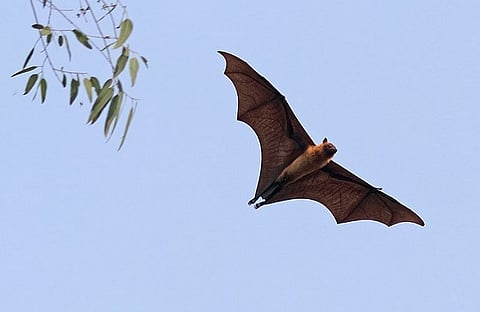

As the world grapples with the novel coronavirus, researchers have found the presence of a different kind of coronavirus -- bat coronavirus (BtCoV) --in two bat species from Kerala, Himachal Pradesh, Puducherry and Tamil Nadu, according to a study by the Indian Council of Medical Research (ICMR).
However, there is no evidence or research to claim that these bat coronaviruses can cause disease in humans, said Dr Pragya D Yadav, Scientist at the National Institute of Virology (NIV), Pune and also the first author of study.
The study has been published in the Indian Journal of Medical Research, The paper says the identification of new coronaviruses in bats in Asian countries such as China, Sri Lanka and Singapore together with the threat that novel coronavirus - SARS-CoV-2 poses led researchers to investigate two bat species in India - Pteropus and Rousettus bats.
Elaborating on the study, Dr Yadav said throat and rectal swab samples of two bat species -- Rousettus and Pteropus -- from Kerala, Karnataka, Chandigarh, Gujarat, Himachal Pradesh, Odisha, Puducherry, Punjab, Tamil Nadu and Telangana during 2018-2019.
The reverse-transcription polymerase chain reaction (RT-PCR) tests and sequencing were used for the confirmation of the findings. A total of 25 bats out of 586 belonging to both species tested positive for BtCoV or bat coronavirus. While all four of the Rousettus species that tested positive belonged to Kerala, 21 bats of the Pteropus species that were found positive were from Kerala (12), Himachal Pradesh (2), Puducherry (6) and Tamil Nadu (1).
No relation with SARS-CoV-2
"These bat coronaviruses have no relation with SARS-CoV2 responsible for the COVID-19 pandemic," Yadav said, adding that Pteropus bat species were earlier found positive for Nipah virus in 2018 and 2019 in Kerala.
Bats are recognised as the natural reservoirs of a number of pathogenic viruses such as Rabies, Hendra, Marburg, Nipah and Ebola virus, states the paper. In addition to this, bats also harbour coronaviruses and serve as their reservoirs.
"In India, an association of Pteropus medius bats with the Nipah virus was reported in the past. It is suspected that the recently emerged severe acute respiratory syndrome coronavirus 2 (SARS-CoV-2) also has its association with bats," the objective of the study titled 'Detection of coronaviruses in Pteropus and Rousettus species of bats from different states of India' stated.
"In the present scenario of changing demography and ecological manipulations, it is challenging to have checks on the encounters of bats with other animals and humans," the study stated, highlighting that the need for active and continuous surveillance remains crucial for outbreak alerts for bat-associated viral agents with epidemic potential, which would be helpful in timely interventions.
The study notes that while the coronavirus does not appear to affect bats, who are their natural hosts, when the virus jumps to humans and other animals, it can cause respiratory, enteric, hepatic or neurologic diseases of variable severity. “It is still not understood as to why only certain CoVs can infect people," the study said.
The scientists stressed on the need for proactive surveillance of zoonotic infections in bats.
The detection and identification of such viruses from bats also recommends cross-sectional antibody surveys (human and domestic animals) in localities where the viruses have been detected.
Similarly, if the epidemiological situation demands, evidence-based surveillance should also be conducted, the study said while emphasising on the need for developing strong mechanisms for working jointly with various stakeholders such as wildlife, poultry, animal husbandry and human health departments.
"In conclusion, our study showed detection of bat CoVs in two species of Indian bats. Continuous active surveillance is required to identify the emerging novel viruses with epidemic potential," Dr Yadav said."This is an ongoing study to understand the prevalence of the Nipah virus in bats," she said.
With PTI inputs